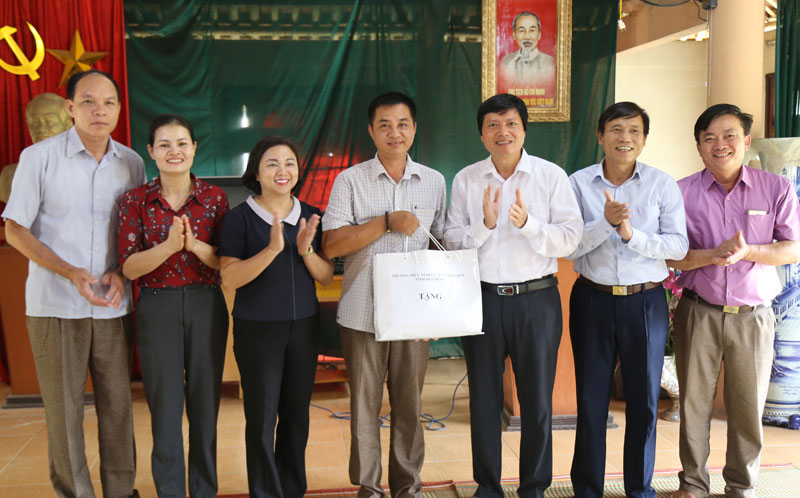
(HBO) – A delegation led by the Deputy Secretary of the Party Committee and Chairman of the People’s Council of Hoa Binh province, Tran Dang Ninh, made a fact-finding tour of Lac Thuy district to examine the building and expansion of self-management models under the instruction of the Vietnam Fatherland Front (VFF), and the piloting of books recording local households’ contributions and the State budget’s financial support for them.
Deputy Secretary
of the provincial Party Committee Tran Dang Ninh and his entourage examine the
self-management model in Luong hamlet of Thuong Coc commune and present gifts
to local residents.
According to the Vietnam Fatherland Front
Committee of Lac Son, the district has maintained effective activities of 420
self-management clans and household groups, 361 reconciliation groups, and 534
security groups. Meanwhile, the project of keeping books on local households’
contributions (excluding fees regulated by the State) and the State budget’s
financial support for them has been piloted in all 28 communes and one township
in Lac Son since November 2017.
Speaking at the working session, Deputy
Secretary of the provincial Party Committee Tran Dang Ninh applauded the
outcomes of self-management models in Lac Son and the bookkeeping project.
He asked local authorities to instruct each
hamlet to set up self-management groups among families basing on local
conditions. This model is very important in the current context because it will
prove effective when hamlets are merged and the number of households and
population increase.
The official also requested the local
administration to review and commend exemplary persons and units in the work.
Meanwhile, it is necessary to continue with the bookkeeping practice in order
to assess this model’s effectiveness before expanding it to the entire Hoa Binh
province.
On this occasion, the delegation of the
provincial Party Committee visited self-management models in the communes of
Trang, La Van Cau, Luong and Thuong Coc. The Deputy Secretary of the provincial
Party Committee presented each model with a set of volleyball equipment. /.
Hoa Binh province is undergoing a dynamic transformation amid Vietnam’s national digital transition. Building on Poliburo’s Resolution No. 57-NQ/TW on breakthroughs in science, technology, innovation, and national digital transformation, the province has rolled out a wide range of practical action plans. A standout initiative is the "Digital Literacy for All” movement, an effort to ensure that no one is left behind in the digital era.
Hoa Binh province is undergoing a dynamic transformation in the wake of the national digital transformation movement. Building on Resolution No. 57-NQ/TW of the Politburo on breakthroughs in science, technology, innovation, and national digital transformation, the province has implemented a wide range of practical action plans. A standout initiative is the "Digital Literacy for All” movement ambitious effort to ensure that no one is left behind in the digital age.
With a spirit of unity and proactive problem-solving, the Party Committee, the government and the people of Dong Lai Commune (Tan Lac District) have made great strides in implementing the resolutions of the 24th Party Congress of the commune for the 2020 - 2025 term. Focusing on leadership and practical actions, the commune has brought the Party’s resolutions into daily life, creating strong impacts and pushing the local development forward.
Amid the nationwide push for digital transformation, young people in Hoa Binh Province are stepping up as dynamic pioneers, applying technology to enhance Youth Union operations and expand the reach of youth-led initiatives. Through creativity and adaptability, Youth Union organizations at all levels have introduced a series of practical solutions, contributing to modern governance and community development.
In recent years, An Nghia commune, located in Lac Son district, has stepped up administrative reform, focusing on improving the quality and efficiency of its single-window service unit for receiving and processing administrative procedures. These improvements have helped create favourable conditions for local residents and organisations to handle administrative procedures, contributing to the commune’s broader socio-economic development.
The Prime Minister-approved master plan to develop the multi-use value of forests ecosystems through 2030, with a vision to 2050, aims to improve the management and sustainable use of forest resources, create jobs, increase incomes, and improve the living standards of ethnic minorities, people in mountainous and remote areas, forest workers and those living near forests.



